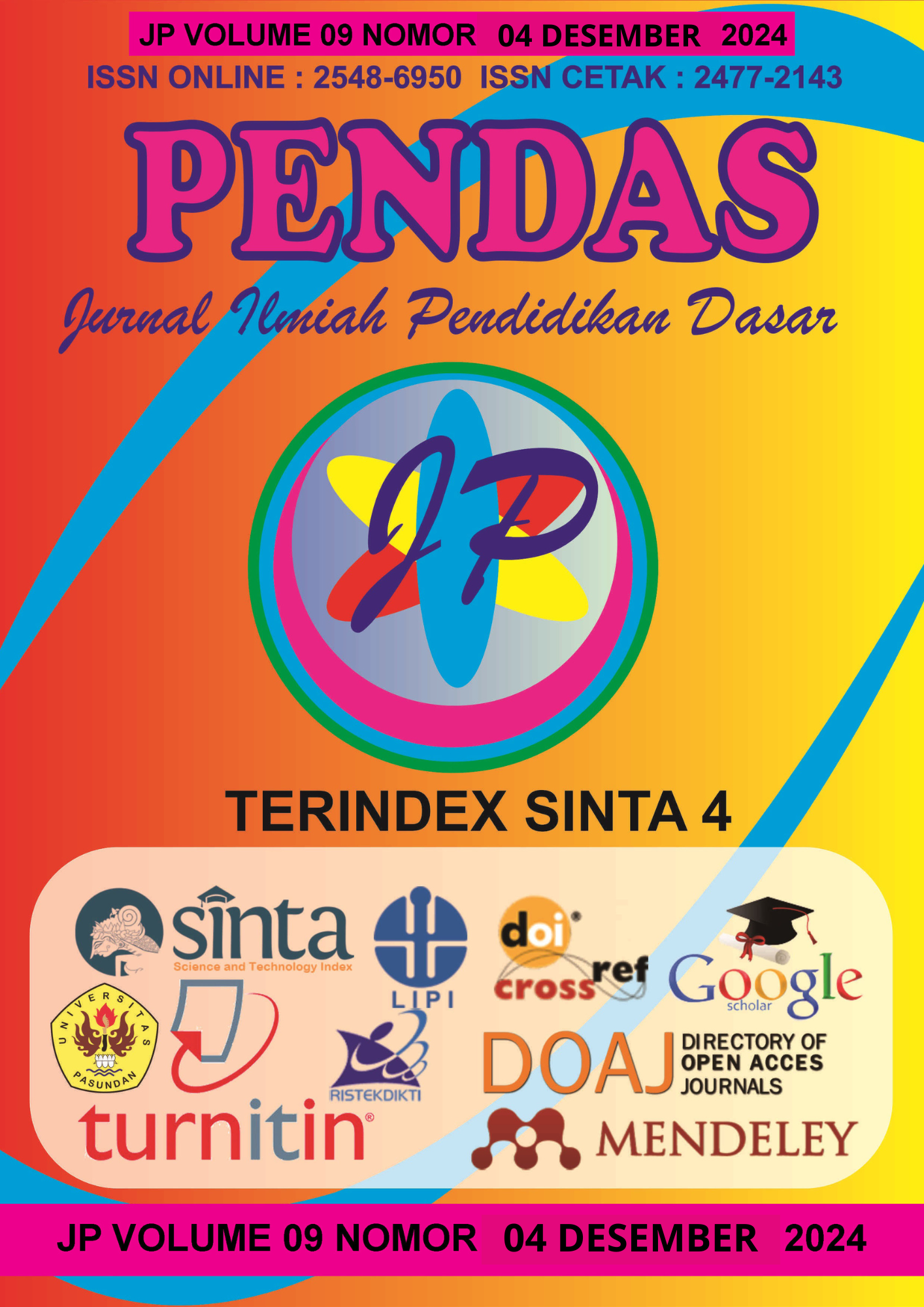KOMUNIKASI INTERPERSONAL GURU DAN KETERLIBATAN BELAJAR SISWA PADA MATA PELAJARAN BAHASA INGGRIS
DOI:
https://doi.org/10.23969/jp.v9i04.20526Keywords:
Teacher’s interpersonal communication, students’ learning involvement, English SubjectAbstract
The lack of student involvement during the learning process is thought to be related to the communication between teachers and students that is not well established. This descriptive-quantitative research aims to prove whether teacher’s interpersonal communication has a significant relationship with students’ learning engagement in English subjects. To answer the research questions, the researcher first determined the Mean Score of each variable and then used it as a basis for determining its relationship. The respondents for this study were 83 students at Airmadidi Adventist Elementary School in grade 5 who took English Subject. The results of the analysis of the data obtained show that the English teacher exhibited the good interpersonal communication (M=4.35) and students practiced active involvement in learning (M=4.22). In addition, by using Pearson Correlation Product Moment, the results showed that there was a significant relationship between teacher’s interpersonal communication and students’ learning involvement in English subjects, with the value of p=0.00<0.05. Based on the results obtained, it is recommended that teacher should be more active in carrying out interpersonal communication with students to trigger student learning involvement during English learning.
Downloads
References
Anggoro, D., & Ningsih, W. T. R. (2023). The effect of teacher interpersonal communication and communication climate in the class on students learning interest economic subjects. International Journal of Scientific in Science and Technology, 10(1), 201–212. https://doi.org/10.32628/IJSRST2295190
Baa, S., Korompot, A. C., & Kharta, A. (2022). Teacher’s interpersonal communication and its impact on students’ motivation in EFL learning. Classical: Journal of Education, Language Teaching and Science, 4(1), 156–169.
Bao, C., Gao, Q., Li, R., & Zhan, Q. (2023). Teacher humor types and academic engagement: mediating role of teacher-student relationship. Research Square. https://doi.org/10.21203/rs.3.rs-3386712/v1
Cangara, H. (2016). Pengantar ilmu komunikasi (Second Edition). Rajawali Press.
Chang D. F, Chien W. C, & Chou W.C. (2016). Meta-analysis approach to detect the effect of student engagement on academic achievement. ICIC Express Lett, 10, 2241–2246.
Conner, T. (2016). Relationship: The key to student engagement. International Journal of Education and Learning, 5(1), 13–22. http://dx.doi.org/10.14257/ijel.2016.5.1.02
Delos Reyes, R. D. G., & Torio, V. A. G. (2020). The relationship of expert teacher- learner rapport and learner autonomy in the CVIF-dynamic learning program. The Asia-Pasific Education Researcher, 1–11. https://doi.org/10.1007/s40299- 020-00532-y
Derakhshan, A., & Xie, F. (2021). A conceptual review of positive teacher interpersonal communication behaviors in the instructional context. Frontiers in Psychology, 12, 1–10. https//doi.org/10.3389/fpsyg.2021.708490
Frymier, A. B. (2016). Students’ motivation to learn in Communication and learning. In P. L. Witt (Ed.), Handbooks of communication science (pp. 377–396). DeGruyter Mouton.
Gabry´s-Barker, D. (2016). Caring and sharing in the foreign language class: On a positive classroom climate in Positive psychology perspectives on foreign language learning and teaching (D. Galajda, Ed.). Springer. https://doi.org/10.1007/978-3-319-32954-3_9
Haqi, L. (2015). Pengaruh komunikasi antara guru dengan siswa terhadapmotivasi belajar siswa kelas V MI Matholi’ul Huda 02 Troso Jepara tahunpelajaran 2015. https://doi.org/10.3389/fpsyg.2022.95065
Hidayati, N. (2020). Interpersonal dialogue to build students ability in using English. Jurnal Ilmiah STBA, 6(2).
Khan, A., Khan, S., Zia-Ul-Islam, S., & Khan, M. (2017). Communication skills of teachers and its role in the development of the students’ academic success. Journal of Education and Practice, 8, 18–21.
Marwiji, H. M., & Mariah, E. Y. (2021). The relationship between teacher’s interpersonal communication and student learning independence during the Covid-19 pandemic. Journal of the Education Window, 1(3), 105–111.
Oga-Baldwin, W. Q. (2019). Acting, thinking, feeling, making, collaborating: The engagement process in foreign language learning. System. https://doi.org/10.1016/j.system.2019.102128
Reeve, J., & Tseng, C.-M. (2011). Agency as a fourth aspect of students’ engagement during learning activities. Contemporary Educational Psychology, 36(4), 257–267. https://doi.org/10.1016/j.cedpsych.2011.05.002
Salas, C. P., Parra, V., Delgado, F. S., & Olivares, H. (2021). Influence of teacher- student relationship and special education needs on student engagement and disengagement: a correlational study. Frontier’s Psychology, 12, 1–12. https://doi.org/10.3389/fpsyg.2021.708157
Sareong, I. P., & Supartini, T. (2020). Hubungan komunikasi interpersonal Guru Dan Siswa terhadap keaktifan Belajar Siswa di SMA Kristen Pelita Kasih Makassar. Jurnal Ilmu Teologi Dan Pendidikan Agama Kristen, 1(1). https://doi.org/10.25278/jitpk.v1i1.466
Sidik, Z., & Sobandi, A. (2018). Upaya meningkatkan motivasi belajar siswa melalui kemampuan komunikasi interpersonal guru. Jurnal Pendidikan Manajamen Perkantoran, 3(2), 190–198.
Sugiyono. (2917). Metode penelitian kuantitatif, kualitatif, dan R&D. CV. Alfabeta.
Talley, P. C., & Hui-ling, T. (2014). Implicit and explicit teaching of english speaking in the EFL Classroom . International Journal of Humanities and Social Science , 4(6), 38–46.
Wahyuni, I. (2017). The power of verbal and nonverbal communication in earning. Advances in Social Science, Education and Humanities Research, 125, 80–83. https://doi.org/10.2991/icigr-17.2018.19
Wang, J., Zhang, L. J., & Zhang, X. (2022). Effects of teacher engagement on student’s achievement in an online English as a foreign language classroom: The mediating role of autonomous motivation and positive emotions. Frontiers Psychology, 13, 1–11.
Downloads
Published
Issue
Section
License
Copyright (c) 2024 Pendas : Jurnal Ilmiah Pendidikan Dasar

This work is licensed under a Creative Commons Attribution 4.0 International License.














































